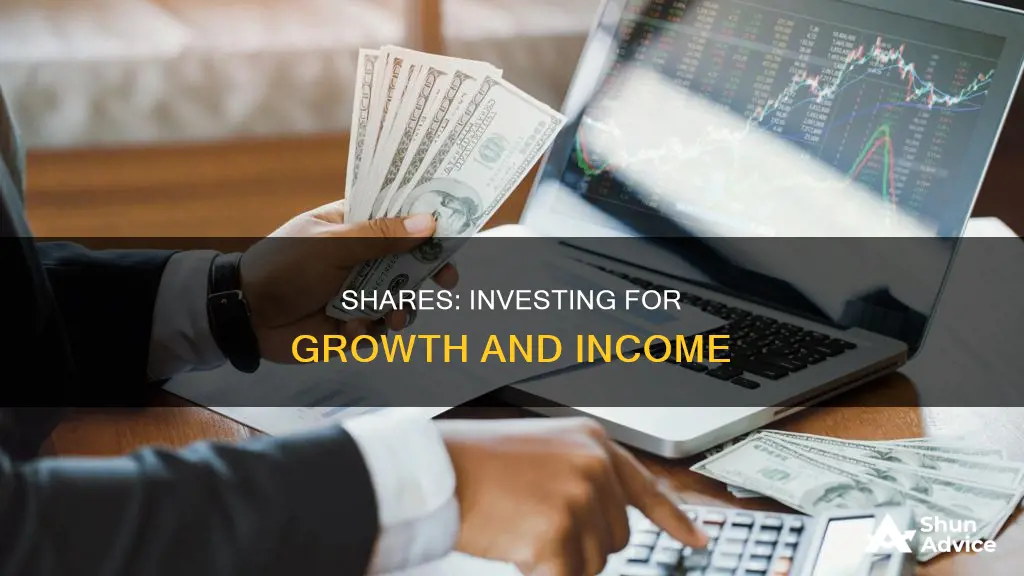
People invest in shares for a variety of reasons. The primary reason is to make money by buying low and selling high. Shares are also a way to own a part of a company, allowing investors to share in the successes and failures of the business. This ownership gives shareholders a say in how the company is run and entitles them to a portion of the profits in the form of dividends. Shares are a convenient investment because they are more liquid than other investments, such as property, and can be bought and sold quickly and reliably. They also add diversity to an investment portfolio, reducing the risk of losing money.
| Characteristics | Values |
|---|---|
| Ownership | Shares allow investors to own a part of a company. The percentage of ownership is equivalent to the percentage of shares owned. |
| Profit | Investors can make money by selling shares for more than they paid for them (capital gain). |
| Shareholders also receive a portion of the company's profits in the form of dividends. | |
| Information | Shareholders are kept informed about company news and updates. |
| Control | Shareholders can exercise some control over how the company is run. |
| Diversification | Shares provide an opportunity to diversify an investment portfolio, reducing the risk of losing money. |
| Liquidity | Shares are liquid assets that can be easily converted to cash by selling them on an exchange platform. |
| Accessibility | Shares are easily accessible to investors, with no requirement for a long-term commitment. |
| Risk management | Features such as "stop loss" enable investors to set a price limit and automatically sell their shares if they fall below this limit, helping to manage risk. |
What You'll Learn

Shares can be bought and sold quickly and reliably
Shares are a unit of ownership of a company that may be bought and sold by investors. The process of buying and selling shares is facilitated by physical or virtual exchanges, such as the New York Stock Exchange (NYSE) or NASDAQ. These exchanges allow investors and traders to submit orders to buy and sell shares, either through a broker or an online platform. The ease of buying and selling shares, along with their potential for generating superior returns, makes them a popular investment choice.
One of the key advantages of investing in shares is their liquidity, which refers to the ability to quickly and reliably convert them into cash. In a liquid market, such as the UK stock market, investors can typically sell shares within a minute of clicking "sell" and receive the cash within 5 working days. This is in contrast to investments in property, which can be difficult to sell quickly and may not find a buyer in a challenging economic climate.
The process of buying and selling shares involves placing bids and asks, respectively. A bid is a buyer's offer to purchase shares at a specified price or the best available price, while an "ask" is a seller's offer to sell shares at a specified price or the best available price. When a bid and an ask match, a transaction occurs, and both orders are filled. The speed at which orders are filled can vary depending on the liquidity of the market. In a very liquid market, orders may be filled almost instantaneously, while in a thinly traded market, orders may take longer to fill or may not be filled at all.
The ease and reliability of buying and selling shares also depend on the type of company and the restrictions on share sales. For example, in the UK, there are two main types of companies: private limited companies (Ltd) and public limited companies (PLC). Shareholders in a PLC have the freedom to sell their shares to whomeasurement they like, whenever they like. On the other hand, shareholders in a Ltd company must receive approval from other shareholders before selling their stake. As a result, PLCs are better suited to stock exchanges, as the freedom to exchange shares between members of the public facilitates faster and more efficient trading.
In conclusion, the ability to buy and sell shares quickly and reliably is a significant advantage of investing in shares. The liquidity of shares, facilitated by physical and virtual exchanges, allows investors to convert their investments into cash relatively swiftly and reliably. However, it is important to note that the speed and reliability of transactions can vary depending on market conditions and the type of company in which the shares are held.
Investors: Money Masters or Risk-Takers?
You may want to see also

Shareholders are kept informed about company news and updates
People invest in shares for a variety of reasons. One of the main reasons is that shares are an easy way to own a part of a company, which allows investors to enjoy the profits that the company makes. Shares also add diversity to an investment portfolio, providing multiple sources of income.
Shareholders also have the right to appoint a proxy to attend and vote on their behalf if they are unable to attend a general meeting. They can stay informed by exercising their right to inspect the company's records and documents, which can provide valuable insights into the company's operations and financial health.
Furthermore, companies often issue other documents and updates about their performance and future plans. While shareholders may not have an automatic right to receive all of these documents, they can still gain valuable information about the company's direction and any upcoming changes.
By staying informed, shareholders can make more informed decisions about their investments, exercise their rights, and protect their interests as partial owners of the company.
Investor Priority: Peace of Mind
You may want to see also

Shareholders can have a say in how the business is run
Shareholders can have a say in how a business is run, depending on the type of shares they own. Shareholders who own voting shares have the right to vote on matters of corporate policy and can influence critical operational decisions. This includes voting on the company's board of directors, dividend distributions, mergers and acquisitions, and other business matters. They can also propose the size of the dividend each year and vote on it at the Annual General Meeting (AGM).
For example, Alphabet Inc. (formerly known as Google) split its stock into three classes of shares in 2014 to preserve the control of its founders, Larry Page and Sergey Brin. Class A shares are held by regular investors with regular voting rights, while Class B shares are held by the founders and have ten times the voting power of Class A stock. Class C shares have no voting rights and are typically held by employees and Class A stockholders.
Shareholders who own non-voting shares do not have the same level of influence as those with voting shares. They forfeit their right to have a say in the direction of the company in exchange for what is often a slightly higher stock price advantage over voting shares.
It is important to note that shareholders do not have a direct say in the day-to-day operations of a company. Their influence is limited to major decisions and the election of the board of directors, who are then responsible for the company's operations.
Shareholders also have certain rights, such as the right to inspect the company's books and records, the power to sue the company for any misdeeds, and the right to attend annual meetings and participate in corporate elections. They can also benefit from increased stock valuations or profits distributed as dividends if the company performs well. However, they also assume a level of risk, as they can lose money if the share price drops or even lose their entire investment if the company goes bankrupt.
Backpack Wheels: Invest in Comfort
You may want to see also

Shares can be easily accessed and sold without penalty
Shares are a popular investment vehicle offering investors partial or full ownership of a company. Shares are easily accessible and can be sold without penalty, making them a convenient option for those seeking liquidity.
Shares can be easily bought and sold on the stock market, providing investors with quick access to their money. In contrast, other types of investments, such as fixed deposits, may restrict access to funds until the investment matures. With shares, investors can sell at any time without limit and easily transfer the proceeds to their bank accounts. This accessibility and flexibility are particularly attractive to investors who may need to quickly free up cash or respond to market changes.
Additionally, shares offer the opportunity to own a portion of a company, allowing investors to enjoy a share of the company's profits in the form of dividends. While not all companies pay dividends, many established businesses and multinational corporations do so to widen their shareholder base. Dividends can be paid in cash or through the distribution of more shares, providing investors with additional wealth accumulation opportunities.
Shares also provide investors with the ability to diversify their investment portfolios. By investing in multiple companies across different industries, investors can balance out potential losses with successes in other areas. This diversification helps to mitigate risk and maximize the potential for gains.
Furthermore, shares are attractive due to their superior returns compared to other investments such as property, bonds, or savings accounts. The potential for higher returns comes with higher risk, but the ease of buying and selling shares allows investors to make timely decisions to manage that risk.
In summary, shares offer a convenient and accessible way to invest, providing investors with the flexibility to buy and sell without penalties. This liquidity, combined with the potential for ownership, dividends, and superior returns, makes shares a popular choice for those looking to grow their wealth.
Retirement Planning: Many Left Behind
You may want to see also

Shares can add diversity to an investment portfolio
Firstly, shares allow investors to own a piece of a company, with each share representing a unit of ownership. By investing in shares, individuals can gain partial or full ownership of multiple companies across different sectors and industries, thus diversifying their portfolio. This diversification reduces the overall risk of their investments while increasing the potential for overall returns.
Additionally, shares can be combined with other types of investments, such as bonds, real estate, commodities, and alternative investments, to create a well-diversified portfolio. This combination of dissimilar assets ensures that an individual's portfolio is not overly exposed to a single asset class or market sector.
For example, if an investor puts all their money into Apple stock, their portfolio is entirely dependent on the performance of the technology sector. However, by investing in shares from various sectors, such as tech, energy, and healthcare, they reduce the risk of their portfolio being significantly impacted by the performance of a single sector.
Furthermore, shares can provide diversification within asset classes. For instance, investors can diversify their stock holdings by investing in companies of different sizes, also known as market capitalization, ranging from small-cap to large-cap companies. They can also diversify their bond holdings by investing in bonds with different levels of creditworthiness or safety, such as US Treasury bonds or corporate bonds.
Lastly, shares can provide international diversification. By investing in shares of companies based in different countries, investors can gain exposure to both domestic and international markets, reducing the impact of country-specific economic cycles on their portfolio.
In summary, shares offer a valuable tool for adding diversity to an investment portfolio by providing ownership in multiple companies, combining with other asset classes, diversifying within asset classes, and offering international exposure.
Investing in People: The Church's Role
You may want to see also
Frequently asked questions
The primary reason people invest in shares is to make money. The general idea is to 'buy low, sell high'. For example, if you buy shares in a company that increases in value over time, you can sell those shares at a higher price and make a profit.
Investing in shares offers several benefits, including:
- Diversification of investment portfolio: Shares provide an opportunity to diversify an investment portfolio, reducing the risk of losing money.
- Liquidity: Shares are a liquid asset, meaning they can be easily bought and sold on exchange platforms without the need for a broker. This provides easy access to cash, as investors can sell shares whenever needed without penalty.
- Ownership and control: Buying shares gives investors partial ownership of the company, entitling them to a share of the profits and a say in how the business is run.
While investing in shares offers the potential for high returns, it also carries risks, such as:
- Market volatility: Share prices can be volatile and are influenced by various factors, including company news, sales performance, and market expectations.
- Loss of investment: If a company performs poorly or experiences unexpected losses, the value of its shares can decrease, resulting in a loss for investors.







